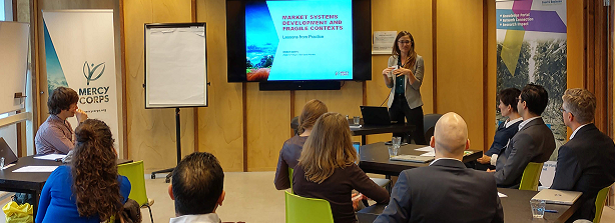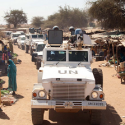Market systems development in fragile and conflict-affected settings

What is Market Systems Development, how does it work in fragile settings, and what are lessons from its application in contexts like north Uganda, northeast Nigeria and Syria? This was the central focus of the last meeting of the Community of Practice on food security & stability, held on January 21, 2020. Thirty participants joined the workshop, co-organized with Mercy Corps which shared its experiences with this approach. The half day workshop explored core concepts of Market Systems Development through concrete case studies as participants discussed lessons learned, challenges, opportunities and implications of the approach and these experiences for participants’ own work.
| Documents to download |
|
This CoP meeting followed up on the last meeting “Supporting transitions towards market-based agriculture in fragile settings” with a more practical, intervention focused perspective. The meeting therefore started with a short recap on the outcomes of this last meeting. Followed by a short presentation on the preliminary outcomes of a study by The Broker on market-oriented approaches of programmes in the Humanitarian-Development-Peace nexus. Alison Hemberger, Mercy Corps’ Team Lead for Markets then gave an introduction to the principles of Market Systems Development (MDS) for fragile settings and shared the experience and lessons of Mercy Corps that are also captured in the following reports: “Facing Up to the Challenges“ and “Beyond Cash: Making Markets Work in Crisis.”
Two cases were used to illustrate how MSD works in fragile settings. In Syria households were lacking access to bread, a staple food. Market analysis (EMMA toolkit) then showed that local bakeries were a key link in the market system. The Bread programme started supplying flour to bakeries, and later reimbursing bakeries for flour purchases. It turned out that these local businesses were better at sourcing flour and adapting to changing supply than aid organizations. In northeast Nigeria the Boko Haram conflict has been ongoing for years. High transit fees and restricted access due to curfews, roadblocks and conflict impede market activity. Layered market systems interventions are therefore currently developed on top of the humanitarian response. The Poultry Development for Resettlement programme in northeast Nigeria was conceived to strengthen input supply and develop the market for a new breed of poultry with a recovery and resilience focus. It cost-shares investment to expand input and poultry supply into new areas with a lead firm, investing in agent networks to breed and sell poultry. These, and other cases led to valuable exchanges among the participants.
Key insights from the discussions included
- When working at a systems level to achieve scale, attribution of results can be problematic. In the case of Northern Uganda many other actors were implementing interventions, so how is it possible to attribute the outcome of a crowding market for inputs to the MSD intervention? One way to approach this is to move towards contribution rather than attribution, though being able to attribute results remains important.
- Attractive in using the MSD approach in fragile contexts is that it focuses on seeing what works and does not work and tries to address this. This is similar to the approach of the Netherlands in Mali after the civil war broke out. It kept its food security programming running throughout the occupation of the north. The chain was still functioning so the programme could keep subsidizing agricultural inputs. Farmers said this was the right approach for them. Meanwhile WFP wanted to start distributing food. Key message is: do not substitute what can still function if you can adapt it. For instance work through community based development actors.
- In humanitarian contexts smaller businesses sometimes lose out to bigger, more formalized, businesses because of their capacity to act as partners to international aid actors. This happened in Uganda and northeast Nigeria as multiple agencies go for the same partners for voucher programming. Smaller businesses however often reach people further out. There is a tendency to say that vulnerable people are not engaged in markets however an economy is there and people do engage, though not always with good outcomes.
- Donors that attempt to get humanitarian and development actors to coordinate, to do joint analysis and to partner up find this difficult. It is for instance very difficult to get humanitarians to appreciate the long-term aspects of programming. Donors can use their position as a powerful actor to force people to talk to each other however. Joint approaches that include other donors, development banks and UN organizations are helpful to this end. In Sudan the Netherlands Ministry of Foreign Affairs organized talks between ILO, IFC and UNHCR which adapted programming, but more time is needed to learn from this.
For a full report of the presentations and discussions, please see the CoP meeting report.






